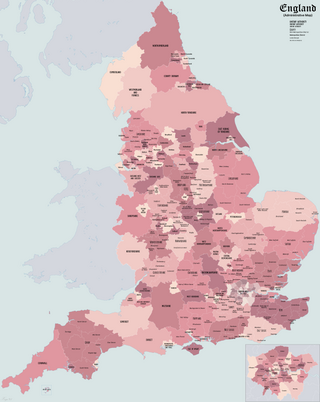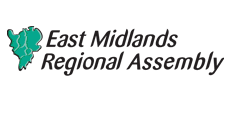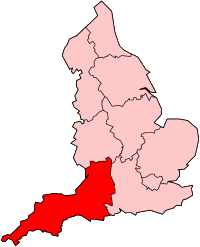
The East Midlands is one of nine official regions of England. It comprises the eastern half of the area traditionally known as the Midlands. It consists of Derbyshire, Leicestershire, Lincolnshire, Northamptonshire, Nottinghamshire, and Rutland. The region has a land area of 15,624 km2 (6,032 sq mi), with an estimated population 4,934,939 in 2022. With a sufficiency-level world city ranking, Nottingham is the only settlement in the region to be classified by the Globalization and World Cities Research Network.

Nottinghamshire is a ceremonial county in the East Midlands of England. The county borders South Yorkshire to the north-west, Lincolnshire to the east, Leicestershire to the south, and Derbyshire to the west. The largest settlement is the city of Nottingham (323,632), which is also the county town.

Metropolitan counties are a subdivision of England which were originally used for local government. There are six metropolitan counties: Greater Manchester, Merseyside, South Yorkshire, Tyne and Wear, West Midlands and West Yorkshire.

The subdivisions of England constitute a hierarchy of administrative divisions and non-administrative ceremonial areas.

ITV Central, previously known as Central Independent Television, Carlton Central, ITV1 for Central England and commonly referred to as simply Central, is the Independent Television franchisee for the Midlands. It was created following the restructuring of ATV and began broadcasting on 1 January 1982. The service is owned and operated by ITV plc under the licensee of ITV Broadcasting Limited. Historically Central made a major contribution to the ITV network schedule – especially in entertainment and drama – but today its main responsibility is the regional news service.

The West Midlands is one of nine official regions of England at the first level of International Territorial Level for statistical purposes. It covers the western half of the area known traditionally as the Midlands. The region consists of the counties of Herefordshire, Shropshire, Staffordshire, Warwickshire, West Midlands and Worcestershire. The region has seven cities: Birmingham, Coventry, Hereford, Lichfield, Stoke-on-Trent, Wolverhampton and Worcester.

The regional chambers of England were a group of indirectly elected regional bodies that were created by the provisions of the Regional Development Agencies Act 1998. There were eight regional chambers, one for each of the regions of England except Greater London, which had opted for an elected mayor and assembly in 1998. All eight regional chambers had adopted the title "regional assembly" or "assembly" as part of their name, though this was not an official status in law. The chambers were abolished over a two-year period between 31 March 2008 and 31 March 2010 and some of their functions were assumed by newly established local authority leaders' boards.

In the United Kingdom, regional development agencies (RDAs) were nine non-departmental public bodies established for the purpose of development, primarily economic, of England's Government Office regions between 1998 and 2010. There was one RDA for each of the NUTS level 1 regions of England. Similar activities were carried out in Wales by the Welsh Government Department of Economy and Transport, in Northern Ireland by the Department of Enterprise, Trade and Investment and in Scotland by Scottish Enterprise and Highlands and Islands Enterprise.
Regional spatial strategies (RSS) provided regional level planning frameworks for the regions of England outside London. They were introduced in 2004. Their revocation was announced by the new Conservative/Liberal Democrat government on 6 July 2010.
The regional arts boards were English regional subdivisions of the Arts Council of Great Britain
The Greater Nottingham Partnership (GNP) was formed in 1994 by Nottingham City Council and Nottinghamshire County Council with the aim of improving partnership working across the Greater Nottingham conurbation and attracting more government regeneration funding into the area.

The East Midlands Regional Assembly was the regional chamber for the East Midlands region of the England. It was based at Melton.
The West Midlands Regional Assembly (WMRA) was the regional chamber for the West Midlands region of England, established in 1999. It was based in Birmingham. It was abolished on 31 March 2010, its functions transferring to West Midlands Leaders Board and to Advantage West Midlands.

The South West of England Regional Development Agency (SWRDA) was one of the nine Regional Development Agencies set up by the United Kingdom government in 1999. Its purpose was to lead the development of a sustainable economy in South West England, investing to unlock the region's business potential. It was abolished along with all the other RDAs on 31 March 2012, with some of its functions being replaced by local enterprise partnerships.

BBC East Midlands is the BBC English Region covering Derbyshire, Leicestershire, Nottinghamshire, Rutland, South Kesteven in Lincolnshire and some northern parts of Northamptonshire.

East Midlands Trains (EMT) was a British train operating company owned by the transport group Stagecoach, which operated the East Midlands franchise between November 2007 and August 2019.

Advantage West Midlands was established in 1999 as one of nine regional development agencies (RDAs) in England. RDAs were created by the UK Government to drive sustainable economic development and social and physical regeneration through a business-led approach. Operating at arm's length from government, RDAs had business-led Boards that were appointed by the Secretary of State for Business, Innovation and Skills. Advantage West Midlands was closed on 31 March 2012 as part of the wider closure of the RDA network.

Local authority leaders' boards are voluntary regional associations of council leaders that have been established in England outside of Greater London to replace certain functions of the now abolished regional chambers. The establishment of the boards was part of the UK Government's Review of Sub-National Economic Development and Regeneration. which brought forward the Government's plans to alter the structure of regional governance in England and was mandated by the Local Democracy, Economic Development and Construction Act 2009. In June 2010, the new Conservative-LibDem coalition government announced plans to remove funding from the new boards and to remove their statutory functions. It was indicated that the boards might continue as voluntary associations of council leaders.

The regions of England, formerly known as the government office regions, are the highest tier of sub-national division in England. They were established in 1994 and follow the 1974–96 county borders. They are a continuation of the former 1940s standard regions which followed the 1889–1974 administrative county borders. Between 1994 and 2011, all nine regions had partly devolved functions; they no longer fulfil this role, continuing to be used for limited statistical purposes.

In England, local enterprise partnerships (LEPs) were voluntary partnerships between local authorities and businesses, set up in 2011 by the Department for Business, Innovation and Skills to help determine local economic priorities and lead economic growth and job creation within the local area. They carried out some of the functions previously carried out by the regional development agencies which were abolished in March 2012. In certain areas, funding was received from the UK government via growth deals. Funding for LEPs was withdrawn by the Rishi Sunak Conservative government in April 2024 and their functions were assumed by local authorities, some of whom have formed Business Boards as replacements.













